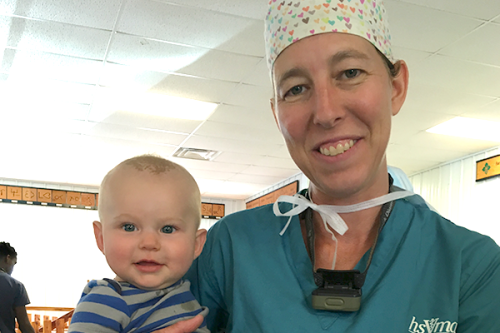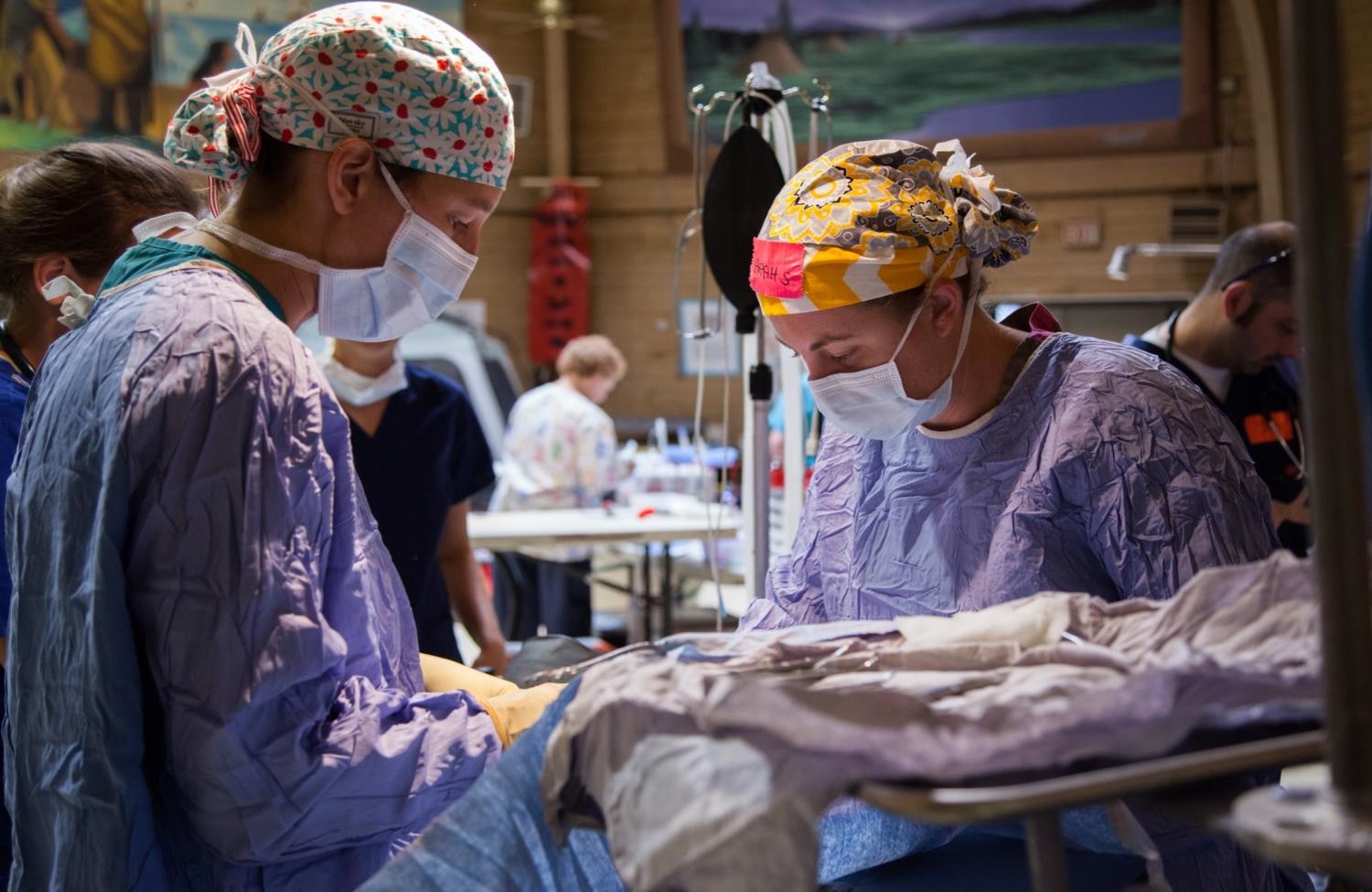Ahne Simonsen

Dr. Ahne Simonsen, DVM is a passionate and enthusiastic high volume spay-neuter veterinarian based in Boulder Colorado. Ahne’s also a mom, a wife, and an inspiration to many! We caught up with Ahne on a day when she was working from her RV, which she and her family take out on the road when she’s working in remote areas providing veterinary care. As the Field Surgical Director for Rural Area Veterinary Services (RAVS) and the Fund for Animals, Ahne has been able to turn her passion for animal welfare into a rewarding career increasing access to veterinary care in underserved communities. A former film crew member, Ahne’s creative and can-do spirit and dedication to her field of work was palpable during our interview!
Veterinary School & Year Graduated: Atlantic Veterinary College, 2007
Questions and Answers
- Tell me about your most challenging and rewarding veterinary jobs or work experiences.
- All of the access to care trips I am involved with are challenging; you need to be flexible and creative and some of the work can be hard to morally navigate when you are on other people's trips. It can be a challenge to find a team that you're working with that agrees with how much effort you can put into creative solutions for animals while maintaining a standard of care and knowing what's fair and best for that animal. I work with a lot of teams where folks are used to doing things their own way, but we all have to come together to be on the same page around our protocols. Things like language barrier and communication in general can also really get in the way. There is a great importance for having folks who are fluent in the local language or having translators and being willing to work through and have really honest and hard discussions that are sensitive and center empathy without judgment. We want folks to feel comfortable saying the reality of their situation and what resources they have and what they don't have and what they're willing to do as their part of care for the animal.
(NB. Access to [veterinary] care work refers to taking actions that address inadequate access to affordable veterinary care and veterinary service providers. Learn more about this in a report by the University of Tennessee.) - What did you love about the position or experience?
- I love being a resource to families where veterinary care is really needed and love seeing the human animal bond in different parts of the world. I also really enjoy mentoring students, interacting with, and being around enthusiastic people. Serving really is contagious in a lot of ways and despite working hard and being so tired, giving your all can be really fulfilling, even when there's a lot of emotional ups and downs. I also love being creative in finding solutions for client's and patient's needs. I love being a resource for families that don't have access to a resource. I love seeing how hard folks work for their fur babies and their animal family members. They are so well loved, it's just a barrier to resources, it's not a lack of passion and love.
- Tell me about your journey to get to that point in your life.
- I was inspired to go to vet school for my second career after working at a wildlife center. I started participating in Rural Area Veterinary Services (RAVS) during my first year of vet school where I met my mentor, Dr. Eric Davis. Through mentorship and RAVS I spent more time participating in access to care fieldwork while in vet school. I tracked mixed animal but leaned more towards equine while also considering small animal shelter medicine. I felt indecisive and lost at the end of vet school but ultimately ended up with a job at a spay-neuter shelter. I really loved RAVS trips and kept going on them until I was eventually hired by RAVS, which has evolved into my current position as their field surgical director.
- As a veterinary student, did you ever imagine yourself taking this journey and having these professional experiences?
- I wasn't even sure if vet school was right for me at first; I never considered myself a science person. When I started volunteering with RAVS and taking animal welfare and behavior classes, I finally felt like I found my place. I didn't see myself working with small animals and I still see myself as and want to be an equine practitioner, despite mostly working with small animals! I learned via vet school that there are so many amazing paths that can be taken as a veterinarian.
- In retrospect, what do you wish you’d known as a veterinary student or early in your career?
- I think it’s important to stay broad but also seek out experiences that will suit your specific path. Make sure that you tailor your experience to cover the parts of your career that you are interested in. I think it is especially helpful to seek out extra mentorship in certain areas of interest that might not be covered extensively in the curriculum.
- Would you have changed anything about your time in veterinary school?
- I wished that I had more of a clinical background and spent more time in a normal small animal clinic to gain more experience with small animal cases and techniques. The more you know about managing cases the better chance you have of finding creative solutions when you're in less than ideal situations.
- Would you have changed anything about your career path since graduating?
- I wish that I completed an internship or spent a couple years working for a mixed animal practitioner out of vet school. I think the bigger your toolkit of knowledge and experience, the more you're able to be creative safely.
- Did you have any mentors or role models along the way that helped or inspired you? Please provide an example of how they helped you or what qualities they had that made them a good mentor? How did you find them?
- I struggled to find strong local mentorship. You don't need mentors to be close by but it really helps reduce stress and trauma. I learned a lot of things by being by myself and being a brand new graduate and having to figure stuff out and advocate for my patients and those sorts of things. I think that even if you don't end up with strong mentorship, if you use your judgment and your morals and your desire to serve that animal to the best you can, you can do it. You'll build your skill set, and it will be really stressful and overwhelming sometimes. I had mentors through RAVS staff who were great because they were encouraging of the fact that I wanted to do access to care work. My mentors were great in telling me to just keep pushing. They were always available, they always made time for me no matter what was going on, or what hour of the night it was.
- Tell me about any pivotal moments or key turning points that shaped your career.
- Participating in my first RAVS trip and seeing the need for access to care services was a major turning point. Also traveling to Nicaragua to help with the international equine program and seeing reliable leadership and rapport was really influential to my journey. Having moments of seeing the challenge that folks go through and the barriers that they have in their daily lives and then seeing the ways that folks overcome that and the importance of these clinics kept pushing me even though it was hard. Also going into these smaller shelters that are so passionate and working so hard has been really motivating.
- Tell me about one or two challenges, setbacks or obstacles that you faced along the way on your professional journey. How did you address those?
- Trying to get into spay and neuter work was initially very difficult. I didn't have the credentials, skills, or relationships and it was hard to get my foot in the door. Starting at a small shelter in need of help and willing to be patient helped me break into the world. Going to watch other vets and participating in a lot of spay and neuter CE also helped get me there. It was challenging to navigate cases and common symptoms when I didn't have a huge amount of clinical experience and couldn't say "I've seen this a million times." I also found it challenging when I transitioned into larger clinics and wasn't seeing each patient all the way through anymore.
- What are the most important lessons you learned as a veterinarian, and still remember today, and would want to tell vet students about.
- Always go with your gut and make sure you’re not acting on fear. Do what helps you to sleep at night by advocating for your patients and yourself. Actively learn from your mistakes and complications and share them with others. Go with your morals and you'll do alright.
- What’s been the biggest highlight of your career so far?
- My biggest highlights are the individual successes for families where we were able to help their animals when they'd lost hope. I work with a lot of communities and I’ve come to realize that hope is a learned behavior. A lot of communities where we work haven't had a background that helped foster hope. Systemic poverty presents barriers, but seeing hope, and hope fulfilled, can help strengthen that bond and improve animal welfare and the families in turn.
- Is there anything else you’d like to tell me that you think would be helpful or relevant to veterinary students or early career veterinarians?
- The money part of access to care work is still really hard because we leave vet school with these huge loans and there aren't enough positions yet to accommodate all the need that there is for access to care work. I think that as a profession we need to find more ways to have more field positions that are salaried because you learn a lot doing fieldwork. You see animals with multiple problems all at once to the point where when I do presentations, people don't believe the cases that I'm showing are real. I would advise heading in the direction of shelter medicine and maybe working a little bit at a shelter and having a large animal job or being mixed animal. So many shelters now are focused on keeping animals out of the shelters that there's a lot of access to veterinary care work starting to be done on a regular basis. Being a shelter employee, you would have a salary, benefits, potentially have mentorship, and you would still get to work on these programs or even start these programs if they don’t exist already. There's a lot of support for this type of work in the sheltering world. Shelter work and emergency work are very similar to the field work that I do. I find that shelter, rural, and emergency veterinarians and technicians tend to be the most comfortable when they come into the field because there are big pieces of their own jobs that they bring with them.

